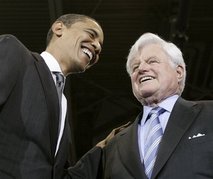World leaders lionized U.S. Sen. Edward Kennedy on Wednesday as a towering figure in American politics, praising his dedication to causes ranging from health care reform to peace in Northern Ireland. The senator from Massachusetts inspired praise from leaders of nations and campaigners for human rights, and many expressed sadness at learning of his death Tuesday from a brain tumor. Tributes poured in, particularly from Britain and Ireland, in recognition of Kennedy’s role in the Northern Ireland peace process.
“He lived to see two great chasms bridged, between Catholic and Protestant in Northern Ireland and between black and white in his own United States,” former Irish Prime Minister Bertie Ahern said. “These achievements, which were the dreams imagined by his brothers in his youth, were the legacy of a long life and of a good and great man who, no matter how often he stumbled or the cause stalled, continued with a tenacity and a great belief that was the hallmark of everything he did and of the man he was.” Lord Owen, who served as British foreign secretary in the 1970s, said Kennedy was “the most influential senator” in the United States. He said Kennedy had put his weight behind peace in Northern Ireland even at the risk of alienating powerful Irish-American allies, whose sympathies lay with the province’s Catholic Irish nationalists rather than the British Protestant majority.
Initially a strong supporter of the Irish nationalist cause, Kennedy was a key American promoter of the peace process, urging Britain to negotiate with the IRA-linked party Sinn Fein, and also reaching out to Protestant Unionists. “His influence on the peace process, and his influence on successive American presidents was I think absolutely crucial, and in particular of course on President (Bill) Clinton,” Owen told the BBC. Irish President Mary McAleese said Kennedy would be remembered “as a hugely important friend to this country during the very difficult times. “His outstanding and remarkable personal contribution was made, despite the sacrifice and sorrow that was part of the overall contribution of the entire Kennedy family,” she said. In Britain, Kennedy was praised for his indefatigable work on causes such as health care and judicial reform. Prime Minister Gordon Brown said “even facing illness and death, he never stopped fighting.
“He led the world in championing children’s education and health care, and believed that every single child should have the chance to realize their potential to the full,” Brown said. Former British Prime Minister Tony Blair called Kennedy “a true public servant committed to the values of fairness, justice and opportunity.” Britain gave Kennedy an honorary knighthood earlier this year. Achmat Dangor, CEO of the Nelson Mandela Foundation in South Africa, said Kennedy had been “a champion of democracy and civil rights.” “He made his voice heard in the struggle against apartheid at a time when the freedom struggle was not widely supported in the West. We remain grateful for his role,” the foundation said. In Australia, Prime Minister Kevin Rudd said Kennedy “made an extraordinary contribution to American politics, an extraordinary contribution to America’s role in the world.” German Chancellor Angela Merkel voiced “deep sorrow” at Kennedy’s death. “Edward Kennedy was for decades one of the outstanding personalities of American politics,” she said.
“His advocacy of justice and peace was marked by conviction and steadfastness.” Italian President Giorgio Napolitano said Kennedy “has left a deep mark and deserves the homage of all the free world.” Commentators also noted the passing of a political generation that included the late senator’s assassinated brothers, President John F. Kennedy and Sen. Robert Kennedy.
“It is one of the strongest brands in American political history that withers away,” said Michael Ehrenreich, editor-in-chief of Denmark’s Kristeligt Dagblad newspaper and an expert on U.S. politics.


Leave a comment
Comments feed for this article